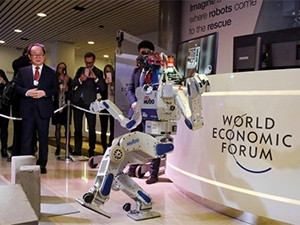
As the world sees more advances in interactive technologies, artificial intelligence and automation, a key challenge for individuals will be to understand and retain their essential humanity.
This is according to top scientists and thought leaders on society and law speaking at the closing panel session of the World Economic Forum annual meeting in Davos, Switzerland.
"All of us need to begin to understand and grapple with how we want to shape these technologies," according to panellist Henry T Greely, the Deane F and Kate Edelman Johnson professor of law at Stanford University.
"We are competing with artificial intelligence," according to Amira Yahyaoui, founder and chair of citizens' action group, Al Bawsala, in Tunisia, and a member of the World Economic Forum's Global Shaper community of leaders in their twenties.
"We really have to show we are the good ones. So the discussion of ethics and value has never been more essential than it is today," said Yahyaoui.
However, Justine Cassell, associate dean for technology, strategy and impact at Carnegie Mellon University's School of Computer Science, does not believe robots are competitors to humans.
"I think of them as collaborators to help us do what we wish to do but can't do alone and help us to be part of a larger community."
She believes robots and artificial intelligence will force people to hone human skills that were much more important generations ago in the days of very low tech.
"Empathy, respect - those skills will be effective for the workplace of the future. It is through comparison with robots that we will know what it is to be human," Cassell commented.
"I am a scientist and I feel that what makes us human comes from our brain chemistry. We are not about our physical bodies but what is going on in our brains," according to Jennifer Doudna, professor of chemistry and molecular and cell biology at the University of California, Berkeley.
Greely agreed that what makes humans human is not the body but what is inside. "We are the wine and not the bottles. I have a metal hip but it hasn't made me less human."
Greely also acknowledged genetics play a part in what makes us essentially human. Being human entails "a learned set of responses to things," he explained.
"There is some genetic basis for altruism, ambition or compassion, but how to get that expressed depends on how we are taught. Being human is not a thing; it is a process. The way to make sure that we are human is to have teachers who teach us how to be human. If a robot internalised the same kind of human reactions that we have, I would call him or it a fellow human."
More than 2 500 business, government and civil society leaders from over 100 countries participated in this year's World Economic Forum annual meeting.
Share